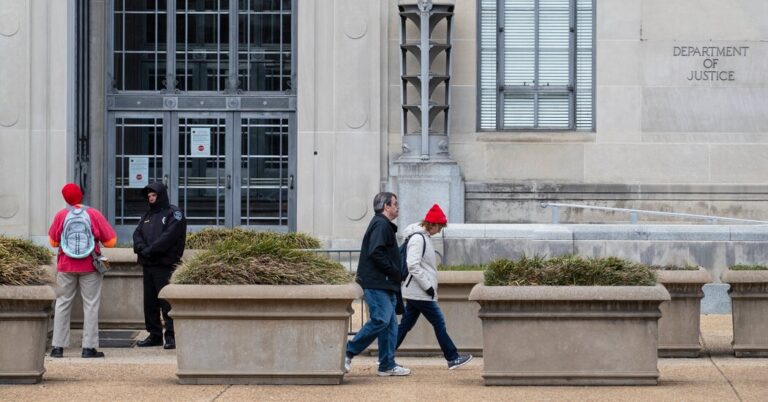Judge Orders Trump Removed From Illinois Primary Ballot
A state judge in Illinois ruled on Wednesday that former President Donald J. Trump had engaged in insurrection and was ineligible to appear on the state’s primary ballot. The decision creates uncertainty for the state’s March election, in which early voting is already underway.
It also adds urgency for the U.S. Supreme Court to provide a national answer to the questions that have been raised about Mr. Trump’s eligibility to appear on ballots in more than 30 states.
The judge, Tracie R. Porter of the State Circuit Court in Cook County, said the State Board of Elections had erred in rejecting an attempt to remove Mr. Trump and said the board “shall remove Donald J. Trump from the ballot for the general primary election on March 19, 2024, or cause any votes cast for him to be suppressed.”
But the decision by Judge Porter, a Democrat, was stayed until Friday, which means Mr. Trump can remain on the Illinois ballot at least until then. A spokesman for the Trump campaign said the ruling was unconstitutional and vowed to appeal.
“Today, an activist Democrat judge in Illinois summarily overruled the state’s Board of Elections and contradicted earlier decisions from dozens of other state and federal jurisdictions,” the spokesman, Steven Cheung, said in a statement.
Judge Porter’s ruling makes Illinois the most populous state where Mr. Trump has been deemed ineligible on constitutional grounds. Officials in Colorado and Maine earlier ruled him ineligible on similar grounds.
The ballot challenges focus on whether Mr. Trump’s efforts to overturn his 2020 election defeat disqualify him from holding the presidency again. The cases are based on a largely untested clause of the 14th Amendment enacted after the Civil War that prohibits government officials who “engaged in insurrection or rebellion” from holding office.
“The decision recognizes the importance of rule of law and upholding the mandate of the U.S. Constitution,” said Caryn Lederer, a lawyer for the Illinois residents challenging Mr. Trump, in a statement.
Formal challenges to Mr. Trump’s candidacy have been filed in at least 36 states, according to a New York Times review of court records and other documents. Many of those objections have been rejected or dismissed, while others remain pending in state and federal courts.
It is not yet clear what Judge Porter’s ruling would mean practically for Republican voters in Illinois if no higher court steps in before Friday.
The Colorado Supreme Court and Maine’s Democratic secretary of state, Shenna Bellows, each found Mr. Trump ineligible. The former president, who is leading in Republican primary polls, has appealed those decisions, and his campaign has described the attempts to remove him from the ballot as antidemocratic.
Mr. Trump is likely to appear on ballots in both Colorado and Maine, which are holding their primaries on Tuesday. The U.S. Supreme Court heard oral arguments in the Colorado appeal on Feb. 8 in a case that could determine Mr. Trump’s eligibility for the ballot nationally. Justices across the ideological spectrum appeared skeptical of the reasoning used to disqualify Mr. Trump. It is not clear when they will issue a ruling.
Without guidance from the U.S. Supreme Court, state officials have been left to make their own decisions about Mr. Trump’s eligibility.
On Tuesday in Indiana, that state’s Election Commission voted 3 to 1 to reject a challenge to his candidacy. One Democratic commissioner said she believed Mr. Trump had engaged in insurrection and should be disqualified, while another Democrat and two Republicans voted to deny the challenge.
In Illinois, Judge Porter, who was appointed to the bench in 2021 and elected to a full term in 2022, said her ruling would be further stayed if the U.S. Supreme Court issued an opinion in the Colorado case inconsistent with her findings.
Illinois, a Democratic stronghold in presidential politics, is not expected to be competitive in November’s general election. But it is a delegate-rich state where the Republican primary could help Mr. Trump lock down his party’s nomination.
According to the Illinois State Bar Association, Judge Porter worked in private practice and as a law-school professor before being appointed to the bench. She also worked in the 1990s as a lawyer for the federal Labor Department. Judge Porter finished ahead of two other candidates in the 2022 Democratic primary, and ran unopposed in the general election.
Her ruling on Wednesday overturned a unanimous decision last month by the bipartisan Illinois State Board of Elections, which determined that it did not have the authority to decide whether Mr. Trump had engaged in insurrection.
While that decision was a temporary victory for the former president, it also revealed potential vulnerabilities in his arguments. Two Republicans who heard the Illinois case — an elections board member who is a former prosecutor, and a former judge appointed by the board to hear arguments — said they believed Mr. Trump had engaged in insurrection on Jan. 6, 2021, when a riot by his supporters at the U.S. Capitol disrupted certification of the presidential election.
Judge Porter, who sits in Cook County, which includes Chicago, agreed that he committed insurrection, but said the matter had been within the board’s purview.
In her ruling, Judge Porter said she “realizes the magnitude of this decision” and its “impact on the upcoming primary Illinois elections.” But, she added, Mr. Trump was ineligible “based on engaging in insurrection on Jan. 6, 2021, and his name should be removed from the ballot.”
Check out our Latest News and Follow us at Facebook
Original Source







